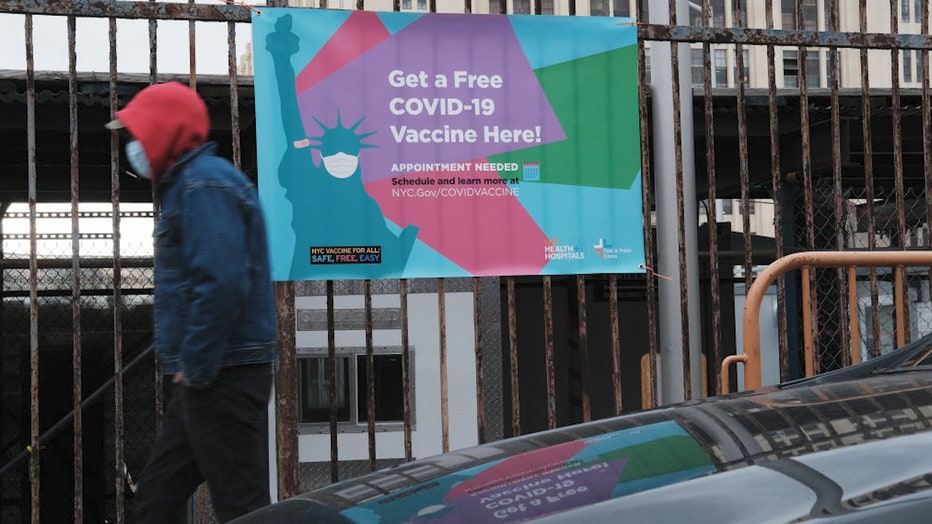CDC changes guidance for 2nd dose of COVID-19 vaccines amid shortages
The U.S. Centers for Disease Control and Prevention changed its guidance regarding the second dose of the COVID-19 vaccine amid nationwide shortages and widespread confusion plaguing vaccination efforts in many states.
According to updated guidance on the CDC’s website, the second vaccine dose can be administered later than the recommended interval of time.
The recommended time intervals between the first and second vaccine doses are:
- Pfizer-BioNTech (30 µg, 0.3 ml each): 3 weeks (21 days) apart
- Moderna (100 µg, 0.5 ml): 1 month (28 days) apart
But the CDC has approved a longer wait for the second dose, stating it is safe and effective to administer the shot 6 weeks (42 days) after the first dose.
The CDC’s updated guidance also says that the Moderna and Pfizer vaccines can be interchanged between the first and second doses in "exceptional situations," but the agency stressed that such a scenario should be avoided and that vaccines should not be mixed, citing a lack of scientific evidence to suggest that mixing the two shots still provides adequate protection from COVID-19.
"These mRNA COVID-19 vaccines are not interchangeable with each other or with other COVID-19 vaccine products. The safety and efficacy of a mixed-product series have not been evaluated. Both doses of the series should be completed with the same product," according to the CDC’s website.
If a person gets a first dose of the Moderna shot and the 28-day interval period is up, it is recommended that the second dose be Moderna also — and the same goes for the Pfizer vaccine. But according to the CDC, in the "exceptional" event that there are not enough doses of the Moderna vaccine to administer a second shot, it is acceptable to use the Pfizer vaccine.
"In exceptional situations in which the first-dose vaccine product cannot be determined or is no longer available, any available mRNA COVID-19 vaccine may be administered at a minimum interval of 28 days between doses to complete the mRNA COVID-19 vaccination series," the CDC stated.
But the CDC made clear that a vaccine-mixing scenario should be avoided, if possible.

FILE - A COVID-19 vaccine hub taking appointments only stands in Brooklyn as the city begins to run low on doses on Jan. 22, 2021 in New York City.
To help patients avoid interchanging vaccines, the CDC issued suggestions to providers:
- Providing COVID-19 vaccination record cards to vaccine recipients, asking recipients to bring their card to their appointment for the second dose, and encouraging recipients to make a backup copy (e.g., by taking a picture of the card on their phone).
- Encouraging vaccine recipients to enroll in VaxTextSM, a free text message-based platform to receive COVID-19 vaccination second-dose reminders.
- Recording each recipient’s vaccination in the immunization information system (IIS).
- Recording vaccine administration information in the patient’s medical record.
- Making an appointment for the second dose before the vaccine recipient leaves, to increase the likelihood that patients will present at the same vaccination site for the second dose.
RELATED: UK COVID-19 variant ‘may be’ more deadly, prime minister says
The CDC’s revisions came as vaccine shortages were being reported throughout the country and the world.
States are dramatically ramping up their vaccination drives, at the federal government’s direction, to reach people 65 and older, along with certain others.
President Joe Biden, who was inaugurated on Wednesday, has made it clear that his administration will launch an aggressive strategy to attack the crisis, and he vowed to administer 100 million shots in his first 100 days.
Less than half of the 36 million vaccine doses distributed to the states by the federal government have been administered so far, according to the CDC. Public health officials have said the gap could reflect recordkeeping delays as well as disarray and other failings at various levels of government in actually getting shots into arms.
In a statement, HHS said that jurisdictions actually received about a 5% increase in vaccine allocations this week from what they got in the past couple of weeks.
Countries across Europe are also having problems getting enough doses to provide protection against a virus that is now appearing in new, more contagious variants around the globe.
RELATED: Health experts blame rapid expansion for vaccine shortages
Pfizer said last week it would temporarily reduce deliveries to Europe and Canada while it upgrades capacity at its plant in Belgium, which supplies all shots delivered outside the United States. Pfizer’s primary site for manufacturing vaccine for the U.S. is in Kalamazoo, Michigan.
In the U.S., some states have suggested they may run out by Thursday and are unclear when new doses will arrive.More than 414,000 deaths in the U.S. have been blamed on COVID-19.
The Associated Press contributed to this report.

